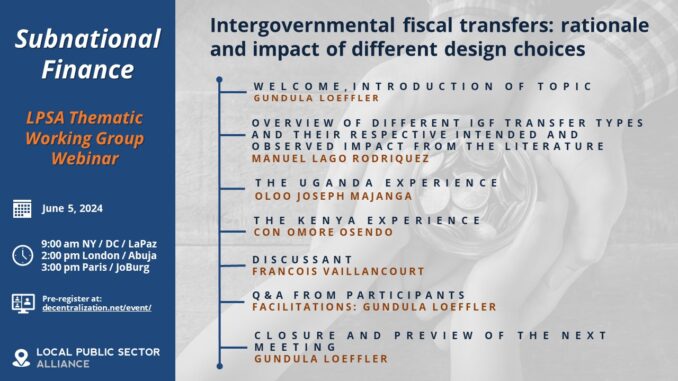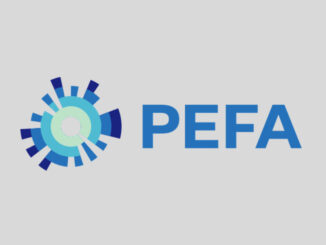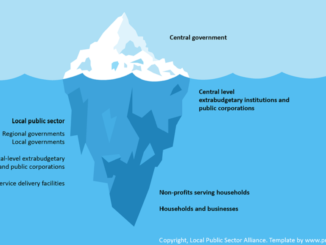
LPSA’s Thematic Working Group (TWG) on Subnational Finance aims to bring together government officials, policy practitioners, scholars, civil society organizations, and citizens who share an interest and expertise on fiscal decentralization, multilevel government finance, intergovernmental fiscal relations, and subnational financial management. The 4th open meeting of LPSA’s Thematic Working Group on Subnational Finance took place on June 5, 2024, (9:00 EDT/ 14:00 BST/ 15:00 CEST). The meeting was opened and moderated by Gundula Löffler, ODI Research Fellow & Co-Chair of the working group.
Manuel Lago Rodriguez from University College Dublin presented a survey of the existing empirical literature on the effects of intergovernmental grants on subnational government behavior and performance. He laid out the different types of grants, and how they can be used to fund public services and infrastructure, address fiscal disparities, and help deal with shocks and crises. He then discussed findings from the literature about the different ways in which grants can affect the fiscal decisions, autonomy, and accountability of subnational governments. He also highlighted that the impact of grants varies depending on their type and that designing the best grant system depends on a country’s framework conditions and policy objectives. He concluded by cautioning the audience that some findings, especially from earlier studies, might also suffer from methodological or data weaknesses potentially pointing policy makers into the wrong direction.
John Muheirwoha, Ag. Commissioner Budget Policy at Uganda’s Ministry of Finance presented the country’s Intergovernmental Fiscal Transfers (IGFT) system, which is comprised of unconditional grants, conditional grants, and equality grants. He explained that the grant design is aimed at addressing service delivery disparities, alleviating poverty, and strengthening decentralization. Despite its flexibility and transparency, the IGFT system faces challenges such as limited resources, disagreements over allocations, and concerns about the quality of social services. These issues highlight the need for improved transparency and accountability in addressing social and economic concerns. They also highlight the fact that the effectiveness of IGFT systems is affected by changes in a country’s social and economic situation, pushing governments to continuously innovate and introduce reforms to improve these systems. The commissioner closed his remarks by emphasizing that political economy and ambitions also significantly shape the effectiveness of IGFT systems.
Con Omore Osendo, governance and devolution expert based in Nairobi provided a detailed overview of the IGFT system in Kenya as established by the 2010 Constitution, which was designed to address the historical biases, inequalities, and unpredictability of previous transfer systems. The equitable share, as the main transfer instrument guarantees a minimum of 15 percent of nationally raised revenue to be allocated to the countries in the form of unconditional grants. While this IGFT system constitutes a clear improvement over past practices, he highlighted that it is politically quite contentious and, in its implementation, counties often struggle with delays in disbursements and borrowing approvals resulting, among other issues, in the disproportionate spending on recurrent expenditure. Other challenges of the IGFT system include political disputes over revenue allocations, incomplete transfers of functions from national to county governments, and a backlog in Parliament’s approval of audited accounts of revenue. He closed his presentation by stressing the significance of the independence of the Commission on Revenue Allocation in making sound recommendations and underscored the need to involve county governments in borrowing decisions from an early stage.
During his remarks, Francois Vaillancourt, professor emeritus at the University of Montreal, reflected on the effectiveness of revenue sharing in Kenya despite the political struggles over allocation and emphasized the role of own source revenue generation in strengthening district accountability towards its constituents for Uganda. He also pointed out the political economy challenges of devolving certain functions with respect to education in Kenya and suggested IT solutions and devolving additional revenue sources to districts as possible approaches to boost district own source generation in Uganda. The presentations and remarks were followed by a Q&A session during which participants raised questions regarding the interplay between transfers and own source revenue generation. Gundula Löffler concluded the meeting and announced that the next open meeting of the Thematic Working Group on Subnational Finance will take place on October 9th, 2024.
| Topic | Contributor | Slides |
|---|---|---|
| LPSA Subnational Finance Working Group welcome, introduction of topic, and presentation of agenda | Gundula Löffler ODI Research Fellow SNF Working Group Co-Chair | N/A |
| Overview of different intergovernmental fiscal transfer types and their respective intended and observed impact from the literature | Manuel Lago Rodriquez Researcher University College Dublin | View |
| The Uganda experience: Rationale for choice of existing IGF transfer system and observed effects | John Muheirwoha Ag. Commissioner/ Budget Policy and Evaluation Department MOFPED Uganda | View |
| The Kenya experience: Rationale for choice of existing IGF transfer system and observed effects | Con Omore Osendo Governance advisor Kenya | N/A |
| Discussant | Francois Vaillancourt Emeritus Professor University of Montreal | N/A |
| Q&A from participants | Participants Facilitation: Gundula Löffler | N/A |
| Closure and preview of the next Subnational Finance webinar | Gundula Löffler | N/A |
Reminder: You can join any LPSA Expert Working Group free of cost and receive reminders and updates by opting-in to one or more working group as part of your LPSA Membership registration




